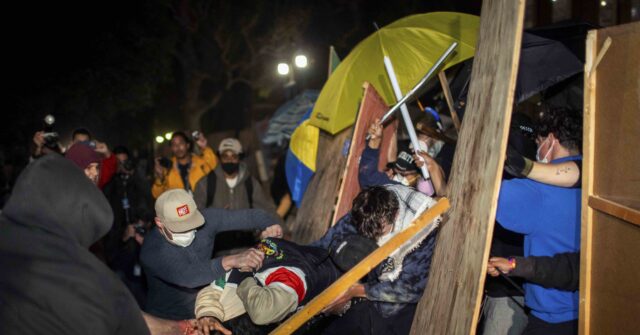In a recent incident at UCLA, two pro-Israel vigilantes were arrested following a violent confrontation with a pro-Palestinian protest encampment that had been established on campus. The encampment, set up by activists on April 25, had barricaded access and demanded that Jewish students denounce Israel and Zionism in order to pass through. This situation escalated into a tense standoff marked by incidents of harassment and violence, particularly aimed at Jewish students and members of the media. UCLA officials initially took little action to diffuse the situation, even reinforcing the encampment with security barriers, leading to accusations of complicity in discrimination against Jewish students.
As the protests continued, a federal judge later ruled in August that UCLA had neglected its duty to protect Jewish students’ freedom, with the university claiming it lacked a responsibility to safeguard their religious beliefs. This lack of oversight was confirmed by a report from UCLA’s antisemitism task force, which found that Jewish students faced harassment and threats but felt unconfident about reporting incidents to university authorities. The encampment remained until pro-Israel vigilantes took action on April 30, prompting the university to finally engage law enforcement to clear the area of protest activity.
The unrest culminated in a significant police presence, as UCLA’s officials responded under growing public pressure after the vigilante conflict gained attention. Local officials, including Mayor Karen Bass, who had previously been silent on the disturbances, expressed condemnation of the vigilantes’ attacks. The UCLA Undergraduate Students Association Council later reported the arrests, noting two felony charges against the vigilantes along with pending actions against others.
Among those arrested was Eyal Shalom, who gained notoriety on social media for allegedly using tear gas during the confrontations. He was identified as one of the individuals responsible for incidents of aggression against journalists covering the events, including accusations of pepper spraying. The other arrested individual, Malachi Joshua Marlan-Librett, faced charges of assault with a deadly weapon and additional felony counts related to prior assaults prior to the vigilante action. These arrests come in the context of a broader crackdown on pro-Palestinian protestors, hundreds of whom were reportedly apprehended as the campus encampment was dismantled.
The vigilante actions were reportedly carried out with community support from residents who were concerned about the treatment of Jewish students amid escalating protests. The use of force by the vigilantes has drawn mixed reactions, highlighting a deep divide in public sentiment regarding the rights of the two sides involved. The situation at UCLA has prompted discussions about the role of campus administrations in addressing hate speech and protecting students’ rights, and it underscores a critical moment regarding campus culture and the tensions surrounding the Israeli-Palestinian conflict.
In conclusion, the unfolding events at UCLA represent a microcosm of a larger debate over free speech, student safety, and the responsibilities of university administrations in actively protecting their diverse student bodies. The actions of both the pro-Israel vigilantes and the pro-Palestinian activists reflect the heightened tensions around these issues and raise questions about the extent to which radical protests can be curbed without infringing on students’ rights. The situation remains a focal point of contention, with potential legal repercussions and ongoing federal investigations that may further complicate the narrative.

